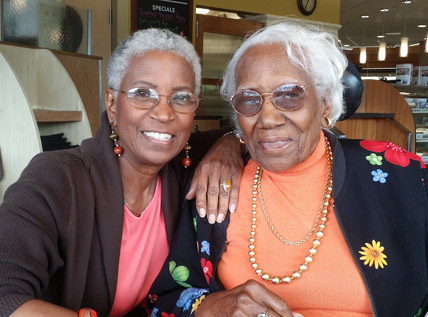By Nancy Varekamp, CNews Editor

Let’s start at the beginning. “My parents were always involved in community service,” said Donna Maxey, RACE TALKS founder. “I was an activist in utero.” “My father belonged to the NAACP as a college student which was considered an underground activity at the time for which he could have been kicked out of school.
After migrating to Oregon from Texas, her parents became active in the Republican Party – the party of Oregonians Tom McCall, Mark Hatfield and Clay Myers – and her father became president of the Young Republicans. “There were always people coming and going from the house, and things going on,” Donna recalled.
“My first solo protest march without my parents was when George Wallace came to the Hilton Hotel in the early 1960’s “I’ve always been independent and pulled for the underdog, which is probably why I ended up being a teacher,” she said
In that role, and others, Donna has found herself blazing trails. “I’ve been the first and only Black person in too many situations, so much that I don’t have to be the first or only anything ever again.”
Growing up in Portland she was always around white people, but attending Pacific University was a culture shock for her. “I was surrounded by white people.” But that didn’t discourage her activism or her belief in building relationships – what she calls “the R word.”
The feeling of being surrounded intensified during her first teaching job in Oroville, California. “It was John Birch country and I was the first and only Black school teacher in the small, rural town.” Intensifying her dissimilarity to the rest of the community was her husband at the time–a white Jew who was a conscientious objector during the Vietnam War era.
While teaching in Portland Public Schools, she was introduced to “Courageous Conversations About Race: A Field Guide for Achieving Equity in Schools,” by Glenn E. Singleton and Curtis Lenton.
“The activities helped us to look at social interactions from perspectives other than our own. When one particularly ‘difficult’ person ‘got’ it, I thought, ‘This is powerful.’
“The only problem was that it was associated with people’s paychecks. If you expect people to make change and it’s connected to their paychecks, it doesn’t necessarily change their minds. It needs to be separate from people’s paychecks.”
In 2010, Donna was one of the several speakers at a McMenamins History Pub program, “Urban Renewal, Urban Removal,” and was upfront about the racism that accompanied the physical and economic displacement her family experienced during the early 1960s.
She was perplexed at how to explain the magnitude of that loss. “How can I share this so people understand what kind of home and community I lived in and what it did to us?” So, instead, I described the fauna and flora in our yard. People were just struck by this. Hey! A boxwood shrubbery is a boxwood shrubbery, regardless of what color the people in the house are.”
The first speaker talked about the unfair laws passed allowing the city and the Portland Development Commission to summarily move the Black community “It was all very technical,” Donna noted. The next speaker was a pictorial historian with photos of the Albina community dating from the 1800s to the early 1960s when the Veterans Memorial Coliseum and Lloyd Center were built. The third speaker was a Black real estate agent who discussed the home purchasing policies of the time.
Then it was Donna’s turn. “The Black community was decimated. My family lost our home, our neighborhood, our church, Daddy lost his barbershop.”
That led to the 2011 partnership between Donna, Uniting to Understand Racism and McMenamins to start RACE TALKS, which they bill as, “filling the spaces between race with compassion and education.”
For more information, visit the RACE TALKS website.